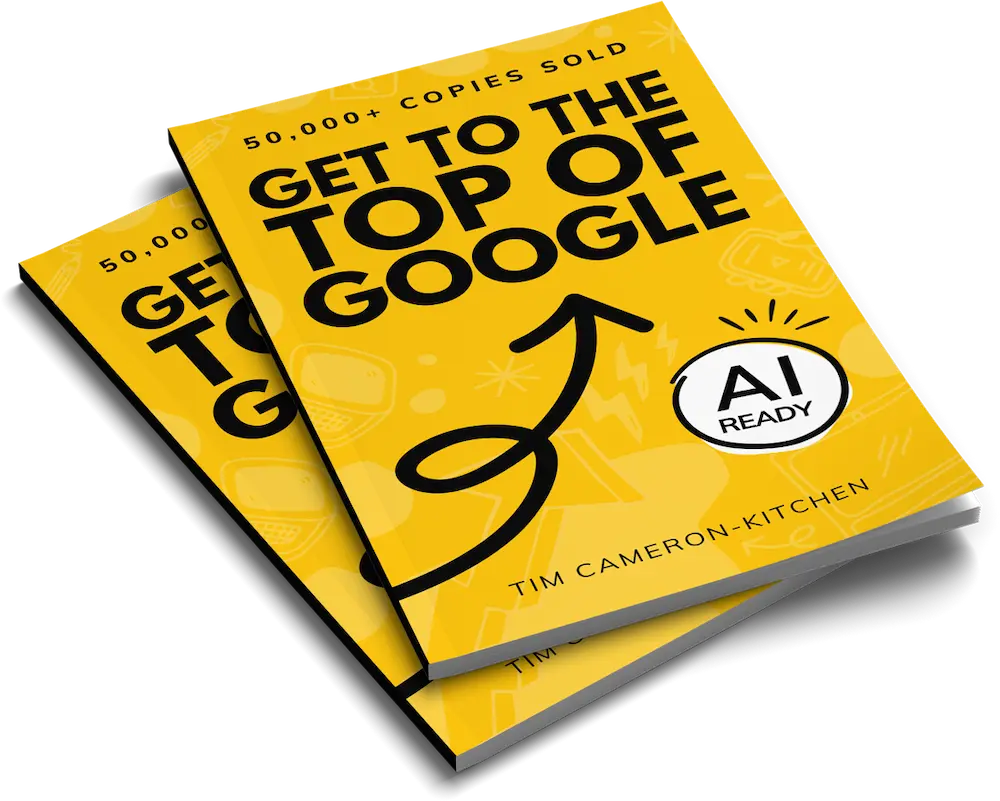Contents

- What’s Happening with Bing?
- Has Bing Overtaken Google?
- Is AI Changing How People Search for Info?
- No Click? No Problem
- The Inevitability of Less Traffic
- We’ve Been Here Before
- Wrong! It Sounds Exactly Like a Featured Snippet!
- Bing vs Google Users — The Numbers
- The First Player in the Game
- But is ChatGPT a Gimmick?
- Is ChatGPT Better than a Search Engine?
- Bing vs Google: PPC, Search, and AI
- Bing Vs Google: Different Layouts and Features
- Bing vs Google: Ranking Factors
- Google vs Bing: Which is Best for Traffic in 2023?
- What to Read Next

Get Weekly Marketing Tips
Join 30,000+ marketers and get the best marketing tips every week in your inbox
Unless you’ve been hiding under the blankets for the last month or two (wouldn’t blame you, it’s cold out there), you’ll probably have noticed that Bing is being talked about a LOT. Some headlines have even been calling Bing Chat (what’s that? Read on to find out) the end of Google.
Is it the end of Google?
Maybe. Maybe not.
But things are certainly hotting up in the world of search engines.
Why?
It all comes down to artificial intelligence.
For years, search firm Google has dominated the search engine market, leaving Bing in the shadows. But with recent developments in artificial intelligence (AI), both companies are making big moves to stay relevant and attract more users.
So, in the Bing vs Google search engine comparison, who’s best for traffic?
Let’s take a closer look.
What’s Happening with Bing?
So, is Bing no longer a joke? (Sorry, Microsoft)
It hasn’t been for a while now.
Of course, Google still has the biggest market share of any search engine, and by a HUGE margin. But the Bing search engine has been steadily gaining ground. And with the release of ChatGPT-3 from the team at OpenAI, alongside Microsoft’s $10 billion investment, things are changing exponentially.
Wait, so what’s ChatGPT-3?
ChatGPT-3 is an advanced AI language model created by OpenAI. It’s designed to understand and generate human-like text, and it’s super helpful for tasks like answering questions, writing essays, or even just having a chat.
Before we can take a look at the question of which search engine is best for website traffic in 2023, it’s crucial to understand a little bit about OpenAI, GPT3, and something else entirely called Bard.
In much the same way that Hollywood occasionally releases two films from two studios about the same subject (think volcano movies), Microsoft and Google announced AI-powered chatbot news they claimed would change the face of search.
Microsoft announced they were upgrading their search engine with ChatGPT-3, while Google announced their own AI tool, Bard. These announcements came back to back.
The problem for Google is that ChatGPT was, by that point, already sweeping the world. It had the fastest user growth rate of any platform ever (faster than Facebook, TikTok, and even Google).
And because Microsoft had already invested in OpenAI, the company behind ChatGPT, it was widely predicted that Bing would soon integrate with it.
Is your marketing underperforming?
Request a free website and marketing review and our team will tell you how to improve your marketing.


So the Google announcement already seemed a little bit…underwhelming. And then it got worse. In the trailer for Google’s Bard, it made a mistake. The result of that blunder lost Alphabet (Google’s parent company) about 7% of its stock (the equivalent of about $100 billion…ouch).
And then Bing started having similar problems. It had fights with the people using it, had hallucinatory bouts of weirdness, and some plain ol’ bare-faced lying. Bing and Microsoft employees have been in damage control ever since.
But ChatGPT is already (somewhat successfully) integrated with Microsoft’s Bing search engine. Let’s take a look at what that looks like.
This is what a search engine results page looks like on Bing once GPT3 has been integrated.
The query is: Plan a workout for my arms and abs with no situps and no gym equipment. It should only take 30 minutes.
That stuff on the right is useful, and all powered by ChatGPT-3.
With the integration of an AI-powered chatbot, Bing has suddenly turned from a nothing in the search engine race (despite powering Yahoo), to being a headline-grabber in terms of awareness. And Microsoft, who owns Bing, is betting serious money they can compete with Google.
What does this mean for your business, website, and most importantly… your website traffic?
Has Bing Overtaken Google?
Nope.
Not yet, anyway.
But that doesn’t mean it should be counted out of the fight just yet.
In December 2022, before people talked about ChatGPT, Bing had about 843 million people visiting its pages every month. But when you compare that to Google’s whopping 74 billion visits, it’s clear that Bing still had a lot of catching up to do.
However, things started to look up for Bing on February 7th, 2023.
That’s the same day that Microsoft announced their investment in OpenAI, and on that day alone, Bing had 30.3 million visits across desktop and mobile web. The next day, it saw just under 32 million visits.
At first glance, it might seem like OpenAI’s investment is causing people to take a closer look at Bing. But if you dig a little deeper, you’ll see that Bing has been on the upswing for a while now.
Back in August 2021, Bing was already getting around 25.8 million visits daily. And in that same month, it even hit a high of 27.5 million daily visits. And even the day before the investment announcement, Bing was still doing well, with 28.9 million visits.
Get to the top of Google
Learn how to get your website to the very top of Google (and turn that traffic into revenue).

So while Bing did see a boost in traffic after the investment news, it’s not necessarily enough to justify a multi-billion dollar investment.
Certainly, many people are heading to Bing to try out Bing Chat. And until Google releases something similar, it’s likely that the number of people using Bing is going to keep rising.
Come the day that Bing (and Microsoft, which recently announced GPT integration with its entire office suite) begin wide-scale advertising on TV and traditional media, there’s a very good chance that a large swathe of people will start using Bing and Bing Chat by default.
And what’s scary for Google is that none of this is a sign that Bing needs saving in any way. It seems Bing has been doing just fine on its own, thank you very much.
Is AI Changing How People Search for Info?
Yes, and no (sorry, that’s an annoying answer).
In the frenzy of its launch, ChatGPT seemed like the best thing to happen to the world since this keyhole for drunk people. There were claims that it would replace search engines entirely since users could ask it questions and get straight, direct answers.
The end of the SERP seemed nigh.
Just imagine. No more sponsored ads, no more SEO fluff, just the answers you need, when you need them.
Check out this ChatGPT-3 query that went viral, causing a lot of people a lot of panic.
That’s impressive, right? Especially when you compare it to a Google query of the same request.
The differences are astonishing at first glance. Impressive even.
Unfortunately, it was all a lot of overhype.
At the time of writing, no AI tool can deliver accurate answers consistently. Sure, that might change soon, but all AI, including ChatGPT, is not to be relied on for accuracy.
That’s not to say that people aren’t using AI chatbots instead of search engines. They are. But the real issue is, when the answers get more reliable and trustworthy, why should those users click on your links at all?
No Click? No Problem
If this all sounds somewhat familiar, let’s remember when Google announced Featured Snippets and Position Zero.
Featured Snippets are those cool little info boxes that pop up at the top of search results. You know, when you ask Google a question and get a quick, to-the-point answer right there? That’s a Featured Snippet. They’re super handy for people because they save you a click.
Now, Position Zero is another name for the spot where Featured Snippets live. It’s called “zero” because it sits above the regular search results, making it numero uno (or numero zero, I suppose) in grabbing attention. So, when you see that helpful tidbit at the top, you’re looking at Position Zero.
When Google announced the introduction of Snippets and Position Zero, it created a considerable buzz. The initial reaction was mixed though. Some businesses were concerned that users would find the information they needed directly in the search results and not click through to their websites.
This concern was primarily driven by the fear of losing potential leads and conversions.
However, businesses adapted their strategies over time to take advantage of Featured Snippets. They realised that being featured could enhance their online presence, credibility, and visibility in search results.
By optimising their content to answer popular user queries and provide value, businesses could capitalise on the benefits of Featured Snippets.
Where does this leave us?
Although there was a mad moment of excitement/concern about chatbot-powered search engines, we’ve hit something of a wall.
It probably won’t take long for that wall to come crumbling down, so let’s review how AI will affect SEO, PPC, and (most importantly) your website’s traffic.
The Inevitability of Less Traffic
If (read: when) these technologies are more capable, people will save time. None of us have enough of it, so we’ll default to the fastest method.
People won’t have time to open multiple pages to get what they want.
We all know the criticism of, say, recipe pages, where you have to read about someone’s granny’s approach to kitchen management while struggling with arthritis before you even get to a list of ingredients.
Check out this example. This text goes on for a few paragraphs before getting to the ingredients, including a whole section explaining what spaghetti bolognese is.
Here’s another one.
Again, that goes on for a good chunk of the page before getting to the ingredients and cooking process.
Now compare that to a ChatGPT request for a recipe for spaghetti bolognese.
Modern blog posts and news articles have devolved into a more widely accepted version of that. Poorly executed SEO has made many search engine results useless. Try searching for, say, the best lawnmower in 2023.
The top three answers are sponsored ads for lawnmowers. The number one non-sponsored article is from Gardens Illustrated. Sounds good, obviously. But they immediately mention they may get “revenue if you click the links and buy the products.”
Today, SEO tactics heavily influence results, making it challenging to discover technical, academic, or non-commercial content. It’s like the internet has become gentrified.
And it’s not just SEO changing the value of the internet. Pop-ups, cookie information, GDPR, and location tracking are a massive hassle.
If a chatbot can give you an immediate recipe based on the contents of your fridge and your calorie requirements, wouldn’t you avoid the dross and get straight to cooking?
This has a huge impact on website traffic and the subsequent ranking signals. The impact could be catastrophic for eCommerce brands that depend on traffic and Microsoft Ads or Google Ads.
For digital marketers, there’s a seismic shift coming that’s difficult but necessary to prepare for.
If visibility starts to decrease because people are getting their answers from AI, what value will blogs or conversion rates have?
The answer? Don’t panic
We’ve Been Here Before
Consider voice search, another “threat” that many heralded as the end of digital marketing and website traffic as we know it. Well, voice search has been with us for a while, and people still visit websites and buy online from the websites they’ve learned to trust.
The voice-search side of things is the perfect example of how we’re going to end up using AI to search for things we want to know, but (probably) as a component of a search rather than the only method of searching.
Even without AI, both Google and Bing offer zero-click internet searches. Snippets that answer direct questions are right at (or near) the top of the page, and the user won’t have to go to a website unless they want to find out more.
Roughly 2/3rds of Google searches are zero-click searches. Every year, that number grows. Bard and ChatGPT are only going to accelerate the zero-click search.
But from Snippets to Position Zero to Knowledge Graph (in 2012!), website traffic isn’t going down. Quite the opposite. Every year, Google alone sends more traffic to websites than the year before.
And that doesn’t even consider the number of people who make a search engine query but don’t click on a link but instead pick up their phone and call or email the business they’ve discovered via search.
In terms of getting website traffic, it will be less about the search engine being used and more about the content on your website.
The key is to think informational vs transactional.
Informational and transactional content have different goals, but both can bring traffic to your site. Informational content focuses on, well, info! It’s all about sharing knowledge and answering questions.
Struggling to get all your marketing done?
Download our marketing priority planner and get your marketing back on track.

Think of blog posts, how-to guides, or FAQs.
This type of content can get you those sweet Featured Snippets, as it’s perfect for quick answers. When people ask questions, they love a speedy, accurate response!
On the other hand, transactional content is all about getting things done. It helps visitors buy, sign up, or download. This means product pages, checkout forms, and subscription boxes. Although not as snippety-friendly, it can still benefit from having clear, well-structured content that can help your site be the answer to a transactional search engine query.
In short, both informational and transactional content can drive traffic.
Certainly, Bard and ChatGPT will be able to answer questions, but so can Alexa. So can Siri. People are still visiting websites. The queries that both Bard and ChatGPT will answer are far more likely to be informational and much less transactional.
So it’s less about Bing vs Google and more about taking a new approach to your site’s content, and the keywords you use.
It’s not a complete change, just a matter of bearing in mind the intent of the user and what it’s going to take to get them to visit your website.
Yes, things will change, but it’s all going to come down to how people use these chatbots.
After all, it’s likely that people will still use Bing or Google search in much the same way as they do now. They ask Google or Bing how old George Clooney is. They want to know what the time is in New York or how much money the latest Marvel film made at the box office.
Although there will likely be a crossover, in that users may ask these questions of search engines or chatbots, there’s also a high probability that what people use chatbots for will likely be different. At the pace that these things are growing, Bard and GPT could end up being our own (brilliant) personal assistants.
But should you keep an eye on developments? Absolutely. Nobody is quite sure what the next step is for Bard, or if Bing can train ChatGPT-4 well enough that it stops getting into internet fights or tripping out.
There’s a chance that AI-powered search engines will change a few things about our websites and how we empower them.
Which brings us back to the original question: in 2023, which search engine is best for your website traffic?
Currently, SEO-powered content and paid search ads always get the top spot on search engine results pages. More and more, those search results aren’t relevant or only slightly related to the query. That’s bad news for the user, search engines, and your website.
What Bing now does (as does the browser add-on WebChatGPT), is augment the output you’ll get from basic ChatGPT with attribution links. So it doesn’t just give you an answer, it gives an answer based on the info it’s found on the internet in real-time, with a link to that information included. So users can scan the responses they get and click to find out more.
Sounds a bit like a featured snippet, right?
Wrong! It Sounds Exactly Like a Featured Snippet!
This means some things will stay the same (kinda, but kinda not).
The same signals that search engines use to determine SERP ranking and snippets will still be in place. It’s just that as well as the same list of links and snippets we now get, there will also be some automated easy-to-digest answer that collects data from multiple sources and presents it to Bing users as a single source of info.
So if we assume that the concept of EEAT will still play a key role in SERP visibility, what’s changed?
Well, for starters, Google’s search engine ranking factors might evolve. But that’s a problem we constantly face. The main concern for businesses that rely on website traffic is the focus of their content. In much the same way that content changed to reflect answer-based content, specific questions with specific answers will have to drive content creation.
But let’s take a closer look at something more important regarding traffic than SEO. Impossible, you say! What could possibly be more important than SEO?
User numbers.
Underwhelmed by your digital marketing agency?
Learn all the signs that it might be time to change

Bing vs Google Users — The Numbers
For a long time, Google has stood apart from every other search engine. It’s bigger, used more frequently, and is such a part of the daily world that Google is now a verb. We don’t do a Google search. We just Google.
Compare that to Bing. In January 2023, Bing only had around 3% market share of search engine usage. In the same month, Google had a 92.9% market share, according to StatCounter.
Now, while it’s true that many people have raced to Bing and are now using it much more often than they did even a few months ago, the question is, will that trend continue? Is the Bing vs Google race even that on?
While there are no definitive answers, the consensus is that it’s always a good bet to side with a Google search. It’s all too easy to assume that even an AI-powered Bing is unlikely to take a major chunk of user traffic from the mighty Google. And even with their AI missteps so far, it’s never wise to underestimate Google.
However, there’s another perspective, so don’t count Bing out. Microsoft is gearing up to make a splash with Bing Chat. They’ve already thrown some serious cash at AI and will spend more (we’re talking millions or even billions!) to show the world that Bing Chat is the bee’s knees compared to other search engines.
Plus, let’s not forget that Bing is already the go-to search engine for millions of office folks using Windows and Office. It’s right there, ready for action, thanks to IT departments picking from Microsoft’s menu of options.
So, Bing’s market share might be growing slowly, but it’s got potential. We’re betting it could zoom past 10% in the next 12 months. Just think about how Amazon made Alexa a household name by promoting the heck out of it. Microsoft’s got that same game plan for Bing. Keep an eye on this underdog!
The First Player in the Game
At the moment, Bing is taking advantage of simply being the first on the playing field. Whether that will translate to long-term use remains to be seen. It will all come down to user preference and AI accessibility. The buzz surrounding the marriage of Bing and ChatGPT is going to fade. And if Google can release an equivalent (or more powerful) AI integration, then (as always), it will come down to user preference.
If Google’s Bard can get up and running, search engine users will come down on one side of the AI divide. User-friendliness and a top-of-the-line Bing or Google search experience are where the fight will take place, and all of the AI in the world isn’t going to change that.
For many users, ChatGPT-integrated Bing is little more than a gimmick. The dramatic influx of people racing to the new tech toy is no surprise, but is it sustainable?
But is ChatGPT a Gimmick?
More people are using ChatGPT than are using Bing. In fact, through February, the number of people visiting the chat.openai.com domain increased by an incredible 85% compared to January. So even though ChatGPT has only been around since November 2022, it’s already earning as much traffic (an estimated 616 million visitors a month) as Bing, which has been going since 2009.
And numbers for Bing are already going down after the integration of ChatGPT into its search results. Partly, this is likely due to Microsoft tinkering with the AI to ensure it doesn’t go off the rails. Results have already started to change and in many cases, even seem muted or muzzled.
Compare that to ChatGPT, which, although it has had updates, still lacks the tight restrictions Bing imposes. According to some sources, ChatGPT is currently attracting around 40 million visitors from around the world every single day. It’s worth noting that although in the US Bing is still ahead of ChatGPT in terms of overall traffic, the opposite is true in other countries like India.
So, no. ChatGPT is a lot more than just a gimmick. It’s here to stay, and it’s going to get better.
Is ChatGPT Better than a Search Engine?
Nope.
As exciting as this technology is, it’s not without its flaws. And it’s those flaws that are going to, for now, ensure it doesn’t replace Google or Bing anytime soon. That’s simply because search engines and ChatGPT’s form of large language learning work differently.
Google and Bing are designed to index, rank, and then retrieve information and material from the internet. That’s what a Google search or a Bing query is designed to do, and that’s what they’re (relatively) good at.
ChatGPT is very different.
It’s designed instead to generate text that reads conversationally. It can’t access the internet, so any information it gives is based on training data from before 2021. And that training data itself can be flawed. This is why ChatGPT has already earned itself a reputation for being a confident liar. It can be biased, will tell you fiction but present it as facts, and ultimately, fail to provide you with the necessary information. For search engines, that’s simply not good enough.
Bing vs Google: PPC, Search, and AI
If organic traffic through Google is the winner simply because of sheer user volume, what about when we look at PPC traffic?
Which is more effective for your online advertising, Bing or Google?
Pay-per-click is such a useful weapon in your brand growth strategy, that knowing whether to place your ads on Google, or Bing is critical to consider.
Google Ads and Bing Ads are the biggest players regarding PPC, but the two offer very different results. When you’re juggling your marketing budget, knowing what you get from either of the two search engine giants can help guide your advertising choices.
The key problem with paid advertising on Bing vs Google is down to cost vs reach.
Google Ads have a bigger audience. Throw a PPC ad on Google, and it’ll get seen by more people. Of course, that also means more competition for your high-earning keywords and a higher cost per click.
On the flip side is Bing Ads, where you’ll find different audiences and a much lower level of competition for keywords.
Less competition means lower costs per click. But you’re losing out on the sheer volume of what Google offers: users.
So there’s something of a trade-off to think about when deciding on Bing vs Google Ads.
Is your marketing underperforming?
Request a free website and marketing review and our team will tell you how to improve your marketing.


Bing Vs Google: Different Layouts and Features
Bing and Google search might be the same tool, but they look and work very differently. Both search engines display different info in different layouts.
Here are some main areas where they’re increasingly working in very different ways.
Video views are incredibly different on Bing and much more user-friendly. Whereas Google presents a video search as a list of links with a small thumbnail, Bing delivers a fully navigable grid that makes it much easier to determine value. Even better, unlike Google, users can click on a video and watch it within Bing, so they don’t get sent to a website to watch the content they want to watch. There’s even a function to get a video preview by hovering over the thumbnail.
Google video searches are lacking, but for image search, it’s still a big leap forward when compared to Bing. While Bing visual search has some cool image features, such as your layout preferences, the overall look of the Microsoft Bing search results page looks overly messy and complicated. So Google wins on image search even as it continues to fall behind on video search.
For business owners and marketing teams, those factors alone should form a big part of your decision whether to optimise for Google or Bing.
Are you a company whose marketing strategy and products are video-led? Or are you more image-based? Think about your target audience too. Let’s take a look at the people who use Bing.
Between Sep 2021-Feb 2022, Bing had a whopping 1.114 billion users monthly. Over half (55%) were researching products, and lots (40%) were planning domestic trips. Bingsters also used it for international travel planning (21%). So, Bing users are big-time buyers and travellers!
Most US Bing searches are navigational, meaning users are searching for specific sites. So, if your target audience is in the US, Bing might be your BFF!
Now, about Bing users themselves. Microsoft Search Network says 73% are under 45, with Statista saying it’s a 50/50 split between male and female users. Microsoft reckons the split is more like 44% female and 56% male. Either way, it’s a pretty diverse crowd!
Bing users tend to be educated, married, and have kids. In fact, 34% are college grads, 53% are married, and 58% have children at home, says Microsoft Advertising.
In a nutshell, Bing users come from various backgrounds, but they’re definitely into buying and travelling. They’re likely to be a little older too since they’ve spent time getting educated, married, and having children.
So, if that’s your target audience, Bing might be the search engine for you!
Bing vs Google: Ranking Factors
One final area to be aware of when considering the best search engine for your business to focus on is the ranking factors. These are the signals that different search engines will use to determine when your website and your content have any value to search engine users.
Despite some common misconceptions, the fact is that both Bing and Google use very similar SEO ranking factors. However, there are enough differences that they’re worth touching on.
Technical Factors
While technical factors will always be considered by search engines (site loading speed, internal linking, and mobile-friendliness, for example), it’s worth noting that Bing and Google respond slightly differently to some of the basics.
For example, a 301 redirect on Google can cause issues and may not index your pages correctly. On Bing, a 302 redirect will be automatically interpreted as a 301 redirect.
While that’s a useful takeaway, it’s essential to consider the impact of each search engine. Both demand high-quality websites that are responsive, full of good content and serve a purpose for the search engine’s user. Where they differ is how they approach metadata.
The Metadata Factor
While not many people get excited about metadata, it’s not something you can afford to overlook as part of your digital marketing strategy. And the fact is that Bing pays a lot more attention to your metadata than Google does.
That’s because Google is more interested in conversational input than technical queries. So while Bing ranks your pages based heavily on keywords in the domain, page titles, and metadata descriptions, Google is considering elements like context. Google’s RankBrain and BERT updates lie at the heart of this difference.
The important takeaway is that optimising for Bing and Google means paying attention to details. Optimising your meta descriptions so they include your keywords is great for Bing, but at the same time, doing so isn’t going to get you penalised by Google. Optimise for both, and you should get good performance on both.
Authority and Social Signals
While Bing always prefers official domain addresses (those that end in .edu or .gov), Google will rank commercial content with the same value as those official sites, as long as that commercial content does provide value. This is always worth bearing in mind when you’re looking for backlinks for driving traffic.
Perhaps more importantly, Google doesn’t consider your social media marketing signals when determining a page’s value, whereas Bing does, and more so than ever. Unlike Google, if you’ve got a Facebook post that’s had a lot of likes or shares or a tweet that’s gone viral, you will find your rankings improve on Bing.
Google vs Bing: Which is Best for Traffic in 2023?
While it’s fair to say that there are some key differences between the two search engines, there is only one answer to this question in 2023.
It depends.
Bing is absolutely, and rightfully, the perfect search engine for some businesses, but not all of them. And it could be a top search engine in the future.
Microsoft may be clawing their way out of the subconscious minds of internet users, but they’ve got a long way to climb if they hope to ever compete with Google. While adopting and integrating ChatGPT into its Microsoft Bing search engine has been a massive step, the entire concept of challenging Google is a big ask.
But Bing has been taking steps to do exactly that for a few years now.
There’s an overriding media sentiment already that Google is under threat from Microsoft Bing and AI. Even Microsoft’s CEO Satya Nadella considers AI integration “a new race.”
And it’s true that Google has some catching up to do regarding AI. But with their long-term AI research and the mind-blowing resources of Google, it’s hard to see them as the underdogs here. Even if their share price occasionally dips, it’s still Google.
Google isn’t THE answer, but it is probably the BEST answer.
The sheer number of people that use Google every single day is mind-boggling. Sure, Bing has spent years fine-tuning and improving, and the latest AI integration has seen a massive surge in traffic. But at the end of the day, Google is simply the leading search engine.
If you want to drive traffic to your website, optimise for Google but pay attention to what Bing is doing and how it ranks you differently.
Get your strategy right, and it won’t be about Bing vs Google. It’ll be about creating a strategy that ensures both Google and Bing will drive traffic to your website.
If you want help with your content strategy, we have a team of content marketing specialists at Thinkplus. Learn more about our content marketing services here.
What to Read Next
- Discover the secrets to skyrocketing your website traffic! In just 90 days, you can triple your site’s visitors by following these expert tips and techniques.
- Make sure you’re reaching the right folks by defining your target audience. Your marketing campaigns might not hit the mark without a well-defined target audience.
- Building a knowledge base streamlines customer support, saving time and boosting satisfaction. Read why your business needs a knowledge base.
- Use the content you’ve already got. Here’s our quick and dirty guide to improving existing blog content.
Ready to supercharge your online presence? Request a free website and marketing review from Thinkplus, your expert digital marketing partner.


























